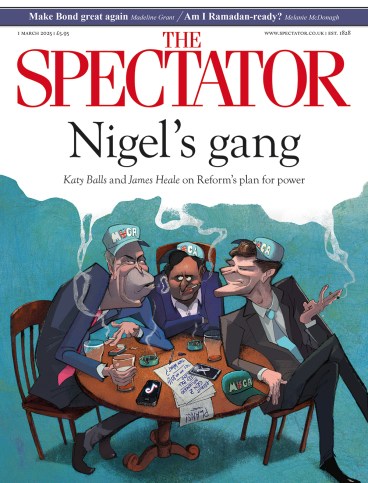
Kyiv
We resemble pilgrims. Because of the war, no one can fly to Ukraine, and so we travel, romantically, by night train. ‘We’ means assorted European dignitaries, a thin sprinkling of Americans, and the media. I find myself sharing a cabin with a former president of the European parliament. The holy day is Monday, the third anniversary of the Russian invasion. We emerge, yawning and crumpled, into the sub-zero dawn. The collective object is to show our devotion to Ukraine’s struggle. This year, our numbers are swollen because of Donald Trump. (In a Polish service station near the border I noticed a magazine cover in which his face is superimposed on that of Neville Chamberlain at Heston aerodrome.) It is alleged that all 27 European Commissioners are in town. They are led by Ursula von der Leyen. President Zelensky meets them.
As last year, I am attending the YES Special Meeting. YES stands for Yalta European Strategy, and is organised by the British-based Ukrainian tycoon Victor Pinchuk. Last year, its title was ‘Stay in the Fight’. This year, it is called ‘Time to Win’, which feels forlorn. The word ‘Yalta’ recalls how eastern Europe was abandoned as the price of victory in the second world war, by an American president. The phrase ‘European strategy’ has a ring to it, but a hollow one. To me, at least, there is a 1930s League-of-Nations atmosphere: a gathering of worried people who think they are good and their opponents – now widely agreed to include the United States – are bad, but do not know what to do about it.
As I enter the conference in the Hyatt hotel, the security check keeps squeaking with alarm, even though I have handed over everything metal. Eventually, the guard picks up his mobile phone and taps in a message, presumably to summon a higher authority to deal with me. But no, he turns out to asking me something with the help of Google Translate. He shows me his screen. It says: ‘Are you wearing dentures?’ No, I have my own teeth, but he lets me totter through anyway.
I try to imagine what I would feel about this euro-Camino to my ancient, elegant, battered capital if I were Ukrainian. Grateful to some extent; flattered perhaps that politicians seek my country as a backdrop for their ambitions. Here is Boris Johnson attempting to explain, though not to justify, the mind of Trump. He urges working slowly, carefully with the Trump minerals deal as, revised, it appears less rapacious than at first. There must be sense in playing this long, though to me Trump’s scheme echoes China’s grim Belt and Road Initiative. And here is Gabriel Attal, the extremely young but already ex-prime minister of France, who speaks grandly of ‘experiencing the beginning of something and the end of something’ and calling for the EU to rival China, the US and Russia. The next day, he is off, as am I, to the East, to inspect how the soldiers wounded at the front are being tended.
But I might also feel a bit empty: the pilgrims will soon be returning, shriven, to their comfortable homes but, for Ukrainians, life will get worse. Most of the conference sessions are successful, but the least good one is also the most telling, comically entitled ‘Brussels in the front line’. On to the stage come a great pile of European Commissioners and a German interviewer who invites them to ‘share their feelings’ about their few hours in Kyiv. Most produce an anecdote about ‘Oleg’ or ‘Svitlana’ or someone they have met who was inspiringly brave and drenched in ‘European values’. But the very titles of these officials breathe their irrelevance. One, a Belgian, is Commissioner for ‘Equality, Preparedness and Crisis Management’; another for ‘Intergenerational Fairness, Youth, Culture and Sport’. This is soft power gone very soft indeed. Since the inauguration of Trump, it is being squeezed by two very hard powers. The best speakers are those who are clearest about what they confront. Lithuanians, Poles, Finns and Danes all understand the direct Russian threat and want much stronger physical defence and reassurance of Article 5 backing. Some say they ‘face non-existence’ and cite secret planned Russian aggressions. But the British, whose natural affinities are with that Scandinavian/Baltic arc, are largely silent. No one seems to think the German political priesthood, as they slowly perform the sacred rites of coalition-forming, is ready to meet the storm, or even admit it is near. Much talk of the long-running scheme to use €300 billion of frozen Russian assets to help Ukraine; little sense that it will happen.
What of the fate of Zelensky? Trump wants to exploit the fact that the President is more unpopular than in the heroic early days. Some Ukrainians are indeed fed up with him, and even more fed up with his constant companion, Andrii Yermak, who excludes other advice and is accused of corruption. But when Trump repeats the Putin line that Zelensky is illegitimate because, under martial law, he is not holding elections, he must know a fair election (a subject which he minded desperately about in 2020) could not be held. There are eight million voters in the diaspora, between nine and ten million internally displaced, one million on the front line and two or three million in the territories occupied by Russia.
With Boris and others, I dine at an outstanding but empty restaurant, reached over slippery snow. I realise we must be within yards of the house just below St Andrew’s Church where Mikhail Bulgakov lived. His great novel The White Guard is set right here, in the bleak midwinter of 1919, as red, white and socialist armies contest for the city and no one (including, it must be said, the author) gives much thought to Ukrainians. This time round, Ukraine has gained more attention, but the ultimate result could be as bad – and worse for the fate of our whole continent.








Comments